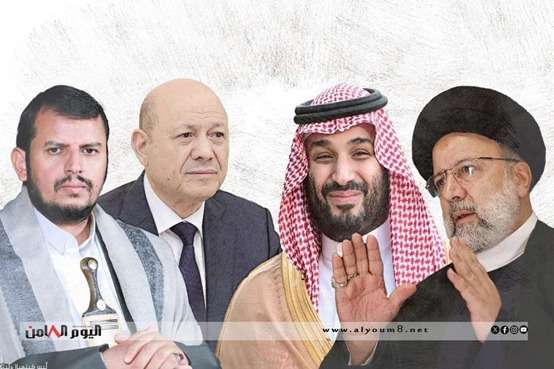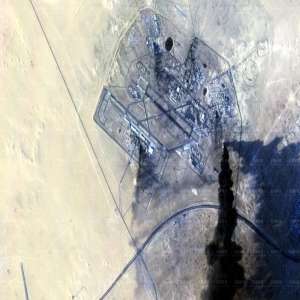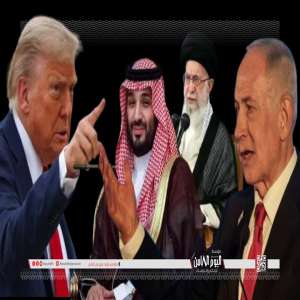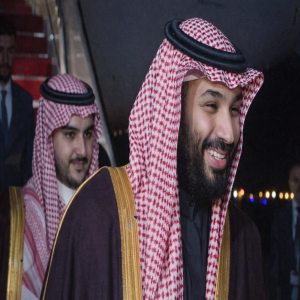"Details of the terms of an agreement made by Riyadh and Muscat".
2024.. A UN initiative for a political agreement that transfers "Saudi Arabia" from a party to the Yemen war to a mediator
"The Houthis tried to exploit Saudi Arabia's rush to raise the ceiling of their ambitions, and demanded the signing of the agreement with Riyadh, which completely rejected it, to confirm that its role is a mediator and not a party, so that the Houthis' efforts to obtain tacit recognition from Saudi Arabia failed."

Saudi and Omani mediation broke through the wall of the Yemeni crisis – Archives
A long marathon of discussions between the Kingdom of Saudi Arabia – which has been leading since March 2015, a military coalition to deter the Iranian project – the UN envoy to Yemen, Mr. Hans Grundberg, announced that commitments had been reached between the Houthis – Tehran's arm in Yemen – and the Presidential Leadership Council, Riyadh's local allies, in order to reach a peace formula that begins with a ceasefire and the opening of corridors, in which the "leader of the Arab coalition" will play the role of mediator, not the party, in exchange for her commitment to pay the salaries of employees in Houthi-controlled areas for about a year.
Saudi media said that Saudi and Omani mediation made a breakthrough in the wall of the Yemeni crisis, at a time when the region is witnessing a military escalation due to the Israeli war in Gaza, incidents threatening navigation in the Red Sea and Washington's announcement of the formation of an international coalition to protect commercial ships.
Grundberg said in a statement that after a series of meetings with the parties in Riyadh and Muscat, including with the Chairman of the Presidential Leadership Council, Rashad Al-Alimi, and the Houthis' chief negotiator, Mohammed Abdul Salam, he welcomed the parties' reaching a commitment to a set of measures that include the implementation of a Yemen-wide ceasefire, measures to improve living conditions, and engagement in preparations for the resumption of an inclusive political process under the auspices of the United Nations.
Mai al-Sheikh, director of strategic communications and media at the envoy's office, told Saudi Arabia's Asharq al-Awsat newspaper that the United Nations is working with the parties to establish implementation mechanisms so that these commitments can be implemented. May Al-Sheikh described the commitments as important and said: "We want to maintain this momentum and there is consensus on the need to move forward as soon as possible.
The UN envoy to Yemen stressed that he will work with the Yemeni parties at the current stage to develop a roadmap under the auspices of the United Nations that includes these commitments and supports their implementation.
Grundberg explained that Yemen's UN-sponsored roadmap will include, among other elements, the parties' commitment to implement a nationwide ceasefire, pay all public sector salaries, resume oil exports, open roads in Taiz and other parts of Yemen, and continue to ease restrictions on Sana'a airport and Hodeida port. The roadmap will also include implementation mechanisms and prepare for a Yemeni-led political process under the auspices of the United Nations, he said.
The government of the Yemeni Interim Presidential Leadership Council – according to the Qatari channel Al-Jazeera – said that the agreement was made between Saudi Arabia and the Houthis, while the political forces in the government were excluded from negotiating its terms, and that the initial draft was referred to the United Nations special envoy to Yemen, Hans Grundberg, to give it an internationalized character.
Al-Jazeera confirmed that the Houthis tried to exploit Saudi Arabia's rush to raise the ceiling of their ambitions, and demanded the signing of the agreement with Riyadh, which completely rejected it, to confirm that its role is a mediator and not a party, so that the Houthis' efforts to obtain tacit recognition from Saudi Arabia failed.
According to Al Jazeera, Saudi Arabia insisted that the agreement between the Houthis and the Presidential Leadership Council be signed by the representative of the internationally recognized Yemeni government, which was announced by the UN envoy.
Since 2022, Muscat in Oman, Geneva in Switzerland and Riyadh in Saudi Arabia have been witnessing indirect negotiations between the Houthi group in Sana'a and Saudi Arabia, which it says is negotiating on behalf of the internationally recognized government with the aim of reaching a final solution to the 9-year-old war in Yemen.
Diplomatic sources and media revealed that the two sides had already reached an agreement to stop the war in Yemen in early October 2023, but its announcement was postponed due to the Israeli aggression on Gaza, which began on the 7th of the same month.
An informed Yemeni source involved in the negotiations revealed that the agreement to stop the war in Yemen is a roadmap that includes 3 basic stages, and the source explained that the first phase is summarized by declaring a complete ceasefire in Yemen, opening the port of Hodeida, and it also includes the return of the Yemeni government to export oil, in exchange for the full opening of flights through Sana'a airport, which is under the control of the Houthis, and the second stage, which is the launch of a Yemeni-Yemeni dialogue, between the parties to the conflict, the Yemeni government and its supporters, and the Houthi group, in preparation for the stage. The third transitional is the organization of general elections
The Qatari website Arabi Post confirmed that the postponement of the announcement collides with Saudi Arabia's fear of the collapse of the agreement if the United States of America classifies the Houthi group as a terrorist organization, especially after two draft resolutions were submitted to Congress in this context so far.
Reuters reported on December 6, 2023, that Saudi Arabia asked the United States for "restraint" in responding to the Houthi group's attacks on ships in the Red Sea, with the aim of advancing the peace process in Yemen, despite the outbreak of war in Gaza, and fears that it will spread there.
White House national security spokesman John Kirby said Tuesday, November 21, 2023, that the United States is reviewing the "potential terrorist designations" of the Houthi group in Yemen, in response to its actions in the Red Sea, which are related to the war in Gaza.
The Qatari website stressed that the US escalation comes at a time when regional mediations are accelerating their steps to end the war in Yemen, after completing their understandings with the Houthi group, through closed-door discussions under Omani auspices.
He said that "Riyadh is determined to close the file of war in Yemen, through the completion of the agreement between the Houthis and the leadership council led by Rashad Al-Alimi, and that the Kingdom's victory in organizing Expo 2030 in its territory has increased its determination to end this file, to avoid any Houthi threats."
Since the collapse of the UN-brokered truce agreement in October 2022, Yemen has been witnessing relative calm, with limited clashes and attacks, after which both sides accuse each other of responsibility.
It is noteworthy that the US decision to reclassify the Houthi group as a terrorist organization was previously canceled by the administration of President Joe Biden in January 2021, days after he won the election over Donald Trump, who approved the designation for the Houthis in the last days of his presidential term.
The Southern Transitional Council (STC), the political authority in the south, welcomed the efforts of the UN and Saudi Arabia to reach a political settlement to the Yemen crisis, but stipulated that any agreement include a negotiated framework to resolve the issue of the people of the south.
Southern politician Khaled Salman said in a blog post on X that the transitional council's welcome of the roadmap was remarkable, and that he was very sensitive to the absence of Grundberg's statement of reference to the southern issue, and it seems that the recent welcome conditional on discussing the southern issue in the upcoming negotiating tracks, has come after assurances he received from the countries sponsoring the road map.
Salman pointed out that the STC's involvement in the agreement track will give the roadmap momentum and alleviate the state of internal southern tension towards it, and strengthen the unity of a common position, or according to agreed lines towards the Houthis, to address the policy of procrastination and procrastination, and Sanaa's attempt to blackmail the sponsoring countries to drain more concessions, with what it means of unjustified deduction from the rights of other parties.



